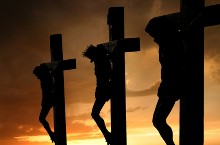How else could they account for the sudden turn of events? The sun had been darkened. The earth had been tortured by a quake. Worst of all, the great veil that separated the Holy Place from the Holy of Holies in the temple had been torn in half!
There in the haunting silence of that hill of death, a solitary cry broke the stillness and rang out like thunder through the Hills of Judea:
"My God, my God, why have you forsaken me?" (Mark 15:34 NIV).
Zion had witnessed many awesome and tragic events, but nothing had ever happened in all its history that would compare with this moment in time. God had come to earth and lived among them, real and ordinary people! And many ended up hating him and most ended up rejecting him! His quiet, loving, gentle spirit threatened their selfish and anxious wickedness. His words taught them responsibility. His life showed them endurance and faithfulness. He was all that sin-filled man had rejected. He was the one who directly confronted the religious with their hypocrisy. And in the hour of his dying breaths, he forgave them:
"Father, forgive them, for they do not know what they are doing" (Luke 23:24).
Yet, all of his words of strength and comfort, all of his power and majesty, and all of his talk about the future kingdom seemed lost in the hollow echo of that one terrifying cry:
"My God, my God, why have you forsaken me?" (Mark 15:34 NIV).
Who would give an answer to this pitiful man-God who cries from a cross on the Hill of the Skull? Certainly no one there could. A thief had witnessed to his divinity and asked to join him in his kingdom (Luke 23:42). A Roman centurion, who only shortly before had overseen his crucifixion, had confessed, "Truly this man was the son of God!" (Matthew 27:54).
None of these words could console the Son who was carrying the sins of the world, in himself, to the grave (2 Corinthians 5:21). Who could answer that pitiful cry?
The answer would come. But, it would not come in the mighty earthquake that terrified the onlookers and tore the temple veil. It would not echo like the thunder and voice of God at Sinai. It would not even be clearly heard on the great Day of Pentecost when the doors of heaven were opened to the very ones who killed the Son.
But, it would come. And it would come softly — softly, yet powerfully — in his sharing about the life of Jesus, the apostle John wrote to people who sought the light in the midst of great darkness. He wrote to strengthen and confirm their faith (John 20:30-31). It was a simple answer with profound implications:
For God so loved the world that he gave his one and only Son, that whoever believes in him shall not perish but have eternal life (John 3:16).









Reader Comments
Archived Facebook Comments